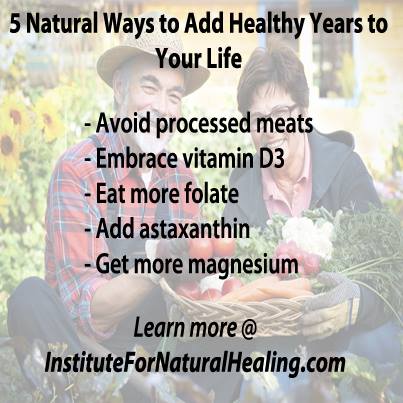When it comes to fighting aging, there are countless ways for Big Pharma to take your money.
You’ve got plastic surgery to make you look younger. Or hormone replacement therapy to restore youthful vitality.
But none of these “solutions” actually make you younger.
The length of your telomeres really determines aging. But since Big Pharma hasn’t figured out how to make money off of fixing them, they don’t like to talk about it.
Telomeres are the protein “caps” on the end of the DNA sequences in your cells. They get shorter as we get older. When telomeres get too short to replicate, cells die. Short telomeres can make you show your age. They may even make you look older than you really are.
On the flipside, longer telomeres may be the key to looking and feeling younger. But more important, they may be the key to living longer.1
Here are five natural ways to lengthen your telomeres.
1. Avoid Processed Meats: One study follows the eating habits of 840 people. The ones who ate one or more serving of processed meat per week had seven percent shorter telomeres than the rest of the group.2 Surprisingly, other junk foods in the study, like soda, did not affect telomere length. (But please don’t think that makes them OK!) You’ll want to avoid anything that comes in a can, lunch meat, and hot dogs. Instead, look for grass-fed meat. It’s free of grain, preservatives, and other nasty surprises.
2. Embrace Vitamin D3: There doesn’t seem to be any limit on the benefits of vitamin D. Lengthening telomeres is no exception. One study finds that women with higher concentrations of D3 in their blood have longer telomeres.3 In fact, women with the highest levels of this vitamin showed up to five less years of telomere aging. Of course, you can get vitamin D3 from being out in the sun. But getting it from supplements or foods like eggs, mushrooms, and cold water fish is more practical.
3. Eat More Folate: Also known as vitamin B9, it plays a major role in DNA maintenance. But it’s also important to DNA methylation, a process that regulates cell development and suppresses viral genes.4 These are all crucial to telomere length. If you are getting enough folate, your DNA should be running smoothly. But a deficiency can cause direct damage to telomeres.5 Skip the supplements for this one. The telomere benefits only come from naturally occurring folate. Some great sources are beef liver, spinach, asparagus, and avocado.
4. Add Astaxanthin: Telomeres are extremely vulnerable to oxidative stress. Studies show that women who take multivitamins with antioxidants have five percent longer telomeres.6 But if you want super-charged antioxidant power (and you do), forget the multi. There’s nothing stronger than astaxanthin. It’s over 50 times more potent than vitamins C and E at fighting oxidative stress. You can find it as a supplement. But we recommend that you get it from wild-caught salmon. A six ounce serving contains about four milligrams of astaxanthin.
5. Get More Magnesium: Telomerase is an enzyme that keeps telomeres long and stable. It’s completely dependent on magnesium, which promotes DNA replication and stability. If you don’t get enough, cells age faster and telomeres shorten.7 And the longer you go on with a magnesium deficiency, the more damage you can do to your telomeres. So seek out foods that are high in magnesium. Leafy green vegetables like spinach are good sources. But you can also get magnesium from nuts like almonds and cashews too. Just don’t go overboard with magnesium. Too much of it can be dangerous, especially if you have kidney problems.
Tell Big Pharma that they can keep their plastic and fake hormones.
You are in control of how you age. Following these steps will help make sure that your telomeres stay nice and long. Most of all, they may add valuable years to your life.
But if you really want to look and feel younger, you need to see this.
Researchers in Wisconsin revealed they found a way to reverse 20 years of aging in just six months in a group of men as old as 81. These men lost over 14 percent of their body fat and gained nearly 10 percent lean mass. Their skin thickened and their bone density increased.
And it was backed up, peer reviewed, and published in one of the world’s most respected medical journals.
Like this Article? Forward this article here or Share on Facebook.
References:
1 http://www.sciencedaily.com/releases/2012/05/120514204050.htm
2 http://ajcn.nutrition.org/content/88/5/1405.full
3 http://ajcn.nutrition.org/content/86/5/1420.abstract
4 http://www.news-medical.net/health/DNA-Methylation-What-is-DNA-Methylation.aspx
5 http://www.jnutbio.com/article/S0955-2863(11)00005-2/fulltext#s0015
6 http://www.ncbi.nlm.nih.gov/pmc/articles/PMC2714373/
7 http://www.ncbi.nlm.nih.gov/pubmed/22379366


